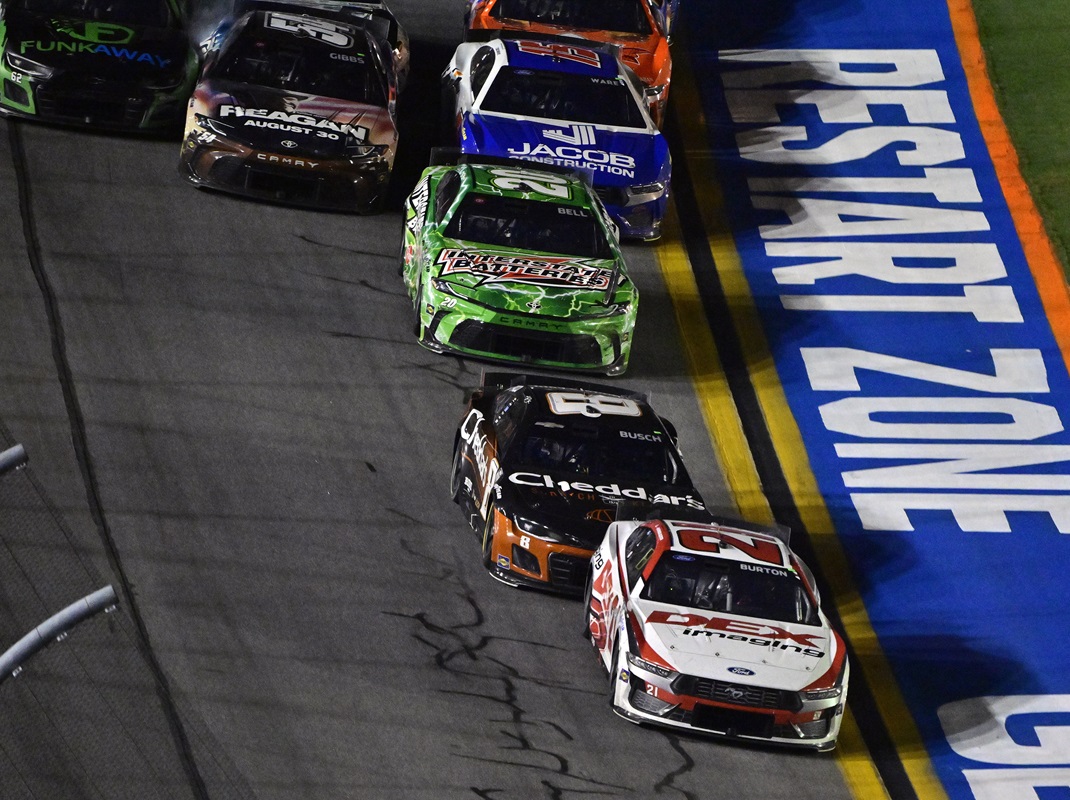OPINION: Is It Time To Rethink NASCAR’s Playoff Eligibility?

Harrison Burton (21) leads the pack to the checkered flag Saturday night at Daytona Int'l Speedway. (Nigel Kinrade Photography)
DAYTONA BEACH, Fla. – Magic swirled through the air surrounding Daytona Int’l Speedway and radiated from television sets across the globe after a gripping and wildly emotional outcome in the penultimate race of the NASCAR Cup Series regular season.
In a true David vs. Goliath battle, Harrison Burton stormed past both two-time Cup Series champion Kyle Busch and 2023 Championship 4 contender Christopher Bell in Herculean fashion to take his first career victory at the sport’s top level.
Simultaneously, the second-generation driver brought family-owned and historic Wood Brothers Racing the team’s long-awaited 100th Cup Series win.
Tears streamed from the 23-year-old’s face the entire cool-down lap, as father Jeff Burton emphatically threw his fists in the air from the NBC broadcast booth and mother Kim shouted in disbelief from atop the No. 21 pit box – all while new Cup Series play-by-play voice Leigh Diffey created an iconic moment three years in the making for the young Burton.
To put it simply: you couldn’t have scripted the ending any better.
With celebrations carrying throughout the evening for most, a harsh reality began to set in for those with their eyes on the postseason. Courtesy of NASCAR’s “win and you’re in” playoff format introduced in 2014, the statistically worst-ranked full-time driver locked himself into the Round of 16 just like that.
Originally, the rule was that a driver had to be inside the top 30 in the standings in order for a win to qualify them for the playoffs. However, as of last year, the only parameter for automatic postseason eligibility by winning a race is that a competitor must start (or attempt to start) every race.
Even after scoring his first career Cup Series win, Burton still sits dead-last in the standings among full time drivers (34th) and has the worst average-finishing position at 25.9, but by the way the rules are written still gets the luxury of securing his first postseason berth.
For drivers on the points bubble, it was literally the worst-case scenario.
Bubba Wallace, who scored his 10th top-10 finish of the season in the Coke Zero Sugar 400, left Daytona ranked 13th in the aggregate standings with a 15.8 average, but 21 points out of a playoff spot. It wasn’t a must-win scenario, but far worse than he entered the weekend in.
Ross Chastain, with eight top 10s and a 14.8 finishing average, lurks right behind the 23XI Racing driver and 27 points out from earning his third consecutive postseason appearance.
Two weeks earlier, a very similar situation played out, when 32nd-ranked Austin Dillon won at Richmond (Va.) Raceway and initially qualified for the playoffs. However, following a couple of controversial moves in the final corner, which saw the former Daytona 500 winner intentionally take out two drivers for the win, NASCAR revoked his postseason eligibility to “protect the integrity of the playoffs.”
Had Dillon’s playoff berth not been stripped, it still wouldn’t have felt right awarding the 32nd-ranked driver with a spot in the Round of 16. Although Burton did nothing wrong, to me, something just doesn’t sit right with having the statistically worst-ranked driver in the playoffs either.
With all of that said, Burton’s win shouldn’t be diminished. He earned every bit of his victory by holding off two of the best drivers in the Cup Series in a wildly impressive display. He’s also a talented, multi-race winner in the NASCAR Xfinity Series.
But I also can’t sit here and pretend like Burton isn’t a lock (in my mind) for a first-round exit.
This isn’t a case of “hating the player,” because how could one not root for someone like Burton and the feel-good story that spawned from that Saturday night finish in Daytona?
“Hating the game” – or the rules – on the other hand, is a valid argument.
If NASCAR wants to “protect the integrity of the postseason,” there should be tighter parameters in place to award playoff berths to the toughest – and the regular season’s best – competitors.
The top-30 rule was okay. Surprise winners such as Michael McDowell, Ricky Stenhouse Jr., Dillon, and even Ryan Blaney (who was also driving for the Wood Brothers when he won at Pennsylvania’s Pocono Raceway in 2017) at one point qualified for the postseason as underdogs.
However, note this: none of them were ranked any lower than 18th in total points by the time the regular season concluded.
With a condensed top-25 rule, perhaps, the Southern 500 at Darlington (S.C.) Raceway would have drivers such as Stenhouse, Noah Gragson, Josh Berry, McDowell, Carson Hocevar, and Todd Gilliland as potential “win and in” candidates, all of who are in arguably more consistent equipment and have put up better numbers this season than drivers like Burton and Dillon have.
Again, nothing should be taken away from Burton’s memorable night and well-earned victory, but NASCAR should reconsider its current parameters of qualifying for the 10-race postseason, which in my opinion should be composed of the most competitive and deserving field of 16 drivers.
It’s a tough balance of excitement, driving quality, and chaos that will play out one more time at the Track Too Tough to Tame.
The good news for Wallace? He’s on the pole for NASCAR’s most grueling race with a shot to win.
The bad news? There’s a host of other playoff hopefuls that want to – and can – win their way into championship contention just the same way.
And that’s where the chaos of the current “win-and-in” format just doesn’t quite feel right, at least in this writer’s mind.
The opinions expressed are those of the writer and do not necessarily reflect those of Race Face Brand Development, Race Face Media, their staff, partners, or other subsidiaries.

